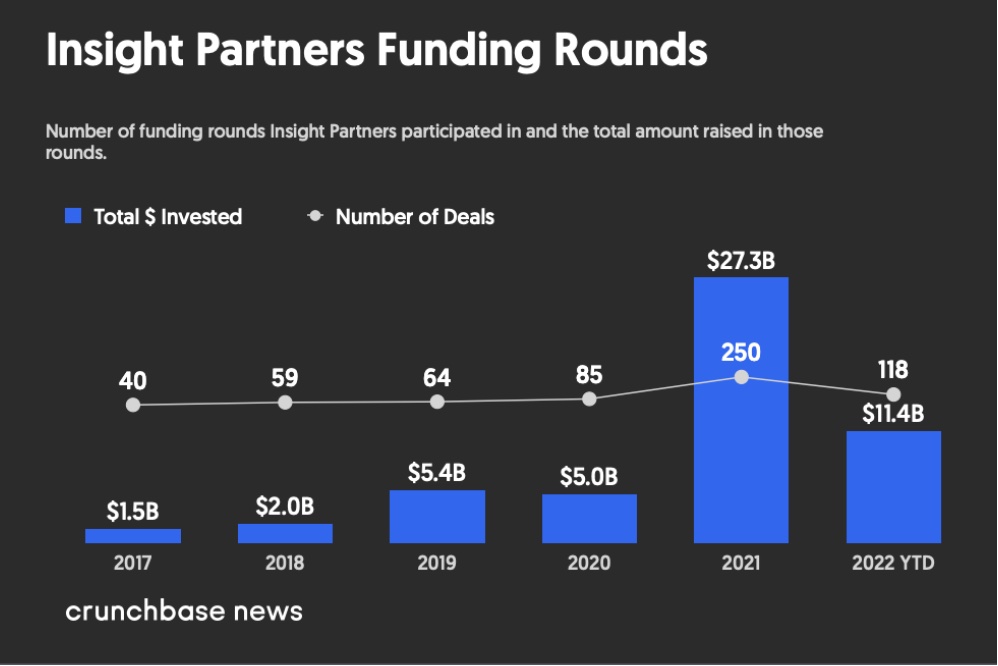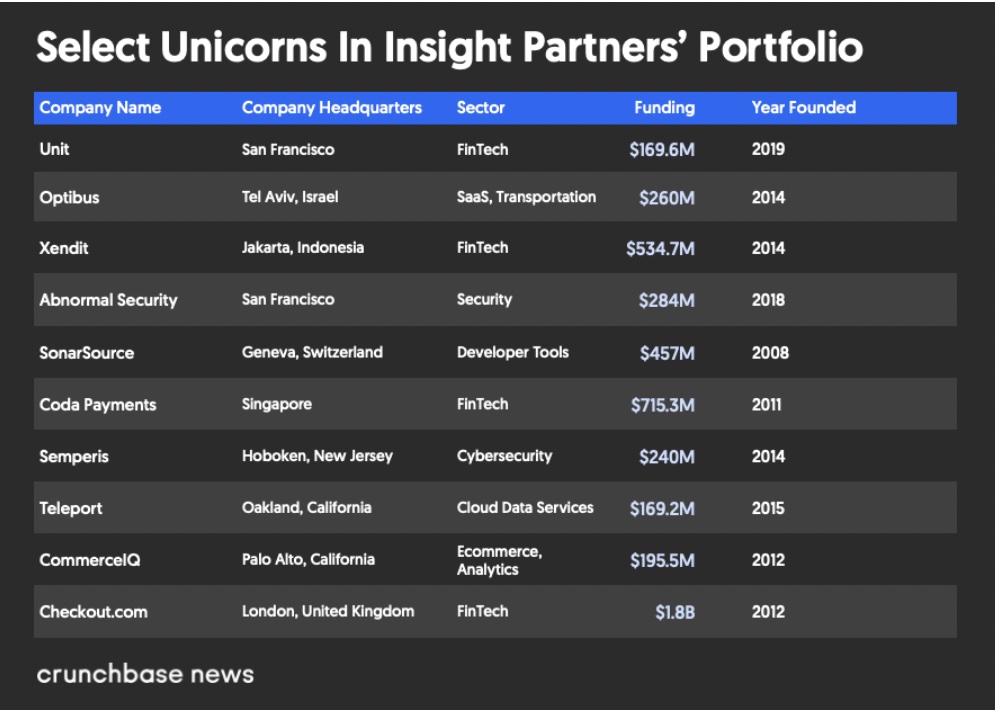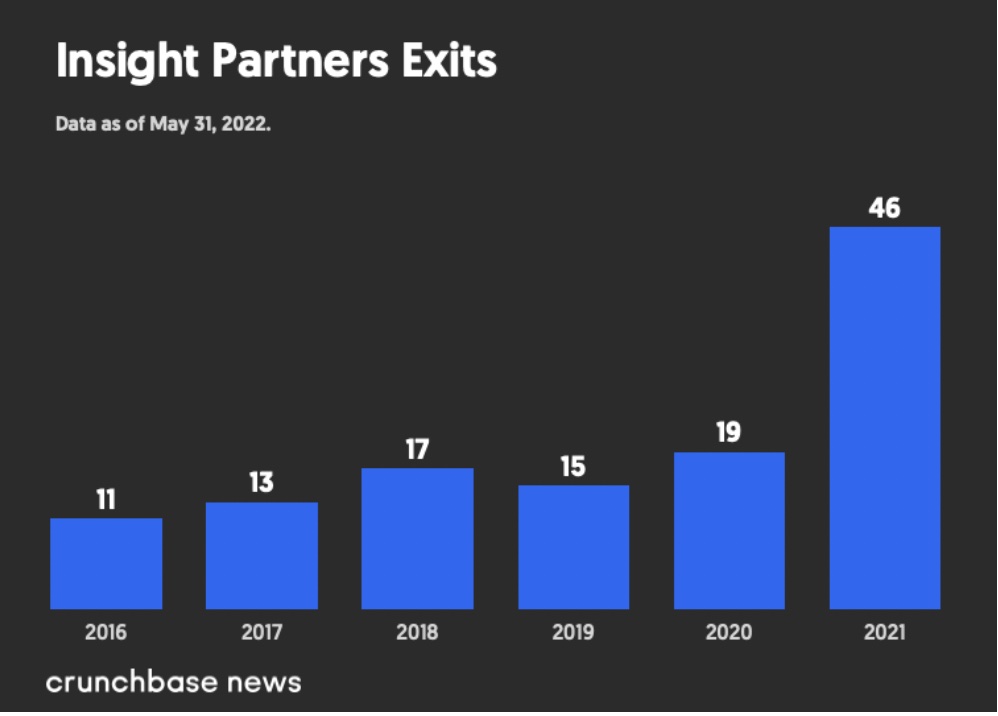Insight Partners nailed its exits in 2021 with more than double its count in 2020. Coupled with a record investing pace, the firm says it will continue to ebb and flow with current market fluctuations just as it has always done.
New York-based Insight Partners isn’t a Silicon Valley venture firm with long ties to Sand Hill Road. But it’s a powerhouse when it comes to software investing, backing companies like Slice, ezCater and Linktree.
In recent years, Insight Partners has become one of the most active and frequent investors in startups. With its latest $20 billion fund, which was announced in late February, it now has more than $90 billion in assets under management.
Search less. Close more.
Grow your revenue with all-in-one prospecting solutions powered by the leader in private-company data.
Even against the backdrop of a global pullback in venture spending, the firm is still going strong. In fact, Insight ranks only behind Tiger Global Management in terms of leading or co-leading investments so far this year, per Crunchbase data.
We chatted with Ryan Hinkle, managing director at Insight, to learn more about the firm’s strategy with its large new fund, especially given the market downturn, and to understand more about its record 2021. Hinkle joined Insight in 2003, and his prior investments include companies such as Twitter, Chegg and Turnitin.
Software focus continues
Since the firm’s formation in 1995, its focus has been on investing in software companies. The thought was that hardware “would commoditize to zero,” according to Hinkle, and that innovation would instead happen on the software layer. So the firm started placing bets on the software sector.
Taking a glance at Insight’s most recent investments, the software focus remains true. There are some notable exceptions over the course of the firm’s history, however, like WeWork, the co-working giant, and meal kit delivery provider HelloFresh.
“And 2020 was clearly a year where we saw a lot of software adoption accelerated in part because of COVID,” Hinkle said. “We remain as excited today as we were in ’95 about software’s ability to continue changing the world.”
What slowdown?
Last year, Insight Partners participated in 250 funding rounds, with 242 of those in venture-backed companies, according to Crunchbase data. That’s around triple the number of deals the firm participated in during 2020, when Insight invested in 85 funding rounds, including 83 in venture-backed companies.

Amid a slowing venture market this year–global venture funding in April reached a new 12-month low–Insight has actually picked up its investment pace.
So far in 2022, the firm participated in 118 funding rounds, most recently Semperis’ $200 million Series C, Xendit’s $300 million Series D, and TradeLink’s seed round, according to Crunchbase data.
It also led or co-led 82 funding rounds this year, a 32% year-over-year increase.
Even if other investors are pulling back, Insight isn’t.
Insight has accelerated its pace of investing to catch up with the rapid growth of the software sector, Hinkle said. The COVID-19 pandemic and the shift to digital work and life further accelerated that
“The number of software companies being created is exploding, so we’re trying to meet these companies where they are, and that pace is what we’re trying to keep up with,” Hinkle said. “We’re not doing anything; the market is evolving so quickly, we’re trying to keep up with it.”
Where Insight invests
While Insight is often considered a “growth-stage” investor, it conducts a fair share of early-stage investing as well.
Of the disclosed deals it has taken part in so far this year, 4.3% are seed-stage raises. Nearly 28% are for Series A stage companies, and more than 31% have been Series B stage companies, Crunchbase data shows.
The company’s seed and early-stage deals go as far back as the late 1990s, according to Crunchbase. The database shows Insight’s first early-stage deal as involvement in Altitude Software’s $10 million Series B in August 1999.
Hinkle said the firm isn’t focusing on a certain letter of the alphabet, but instead picks products and management teams it’s excited about.
“One of the best ways to be positioned for Series B is to have already done a Series A and, likewise, the best way to do Series C is to have already done Series B,” Hinkle said. “And by having as much of the Insight (team) available to many sizes of companies, we help facilitate our ability to get connected with these companies wherever they might be.”

In competing for deals, Insight promotes its onsite team, which helps portfolio companies with a variety of needs. The team is built to look like a software company and assists with everything from revenue to marketing to hiring and acquisitions.
“If it’s a pain a software company has experienced, we built a team to deliver that kind of help,” Hinkle said.
With Fund 12, Insight’s newest, Hinkle said the firm wants to continue knowing “as many of the great software companies as possible,” and provide capital to them.
“And to us, the way that you can do that is you need resources. The fund certainly helps do that. You need access. We have a lot, we can talk about our large team that proactively reaches out to companies. You also have to have a good answer to the question, ‘What do you do besides bring money to the table? And with our Insight Onsite team, we believe we have the answer to that, that is not only scalable, but highly impactful.”
A record year for exits
Since the firm’s founding, more than 50 of its portfolio companies exited through an IPO. Some of its most notable exits include Shopify and Qualtrics.
Last year set a record for Insight in terms of exits: 46 of its portfolio companies exited in 2021, more than double the 19 that exited in 2020, per Crunchbase data.
That makes 2021 by far the most active year for Insight exits in the past decade. In every other year for the past decade, its exits ranged between five and 19.

This year hasn’t been as active for exits, with only two so far. But it’s been quiet across the board for IPO activity. In general, few tech companies have gone public at all this year, besides companies that already entered into SPAC mergers.
The firm can weather the current turbulence in the market, said Hinkle. It’s been through the dot-com boom, Great Recession, and COVID, and he said the firm sees all fluctuations in context.
He said the firm—which has been through the dot-com boom, the Great Recession and COVID— has the context of what a medium to bad market multiple could look like, as well as a great market multiple.
Software, the firm’s focus, also has the “unique attributes” of high recurring revenue and potentially low cost of renewal, he said. Software companies, when compared to other sectors, also typically exhibit high growth and profit combinations.
Because of that, Hinkle believes the firm’s investments will “continue to command premium valuations no matter the regime.”
“We’ve invested in good times and we’ve invested in bad times,” Hinkle said. “If you look, consistently we’ve been aggressive investors in whatever the prevailing multiple regime is.”
Crunchbase Queries Used In This Article
Insight Partners Funding Rounds
Illustration: Dom Guzman

Stay up to date with recent funding rounds, acquisitions, and more with the Crunchbase Daily.











![Illustration of pandemic pet pampering. [Dom Guzman]](https://news.crunchbase.com/wp-content/uploads/2021/03/Pets-2-300x168.jpg)
67.1K Followers